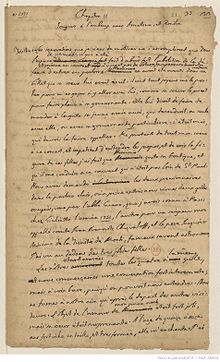 page from the manuscript | |
| Author | Giacomo Casanova |
|---|---|
| Original title | Histoire de ma vie |
| Language | French |
| Genre | memoir, autobiography |
| Set in | Europe, 18th century |
| Publication place | Kingdom of Bohemia |
Original text | Histoire de ma vie at French Wikisource |



Histoire de ma vie (The Story of My Life) is both the memoir and autobiography of Giacomo Casanova, a famous 18th-century Italian adventurer. A previous, bowdlerized version was originally known in English as The Memoirs of Jacques Casanova (from the French Mémoires de Jacques Casanova) until the original version was published between 1960 and 1962. The unexpurgated English translation was published between 1966 and 1971.
From 1838 to 1960, all the editions of the memoirs were derived from the censored editions produced in German and French in the early nineteenth century. Arthur Machen used one of these inaccurate versions for his English translation published in 1894 which remained the standard English edition for many years.
Although Casanova was Venetian (born 2 April 1725, in Venice, died 4 June 1798, in Dux, Bohemia, now Duchcov, Czech Republic), the book is written in French, which was the dominant language of the educated classes at the time. The book covers Casanova's life only through 1774, although the full title of the book is Histoire de ma vie jusqu'à l'an 1797 (History of my Life until the year 1797).
On 18 February 2010, the National Library of France purchased the 3,700-page manuscript[1] of Histoire de ma vie for approximately €7 million (£5,750,000). The manuscript is believed to have been given to Casanova's nephew, Carlo Angiolini, in 1798. The manuscript is believed to contain pages not previously read or published.[2] Following this acquisition, a new edition in the Bibliothèque de la Pléiade, based on the manuscript, was published from 2013 to 2015.[3]
- ^ The manuscript can be viewed in the site gallica.bnf.fr.
- ^ Symons, Arthur, Casanova at Dux, ebooks.adelaide.edu.au, archived from the original on 2009-06-05, retrieved 2009-06-27,
This manuscript, in its original state, has never been printed. (...) Herr Brockhaus employed a certain Jean Laforgue, a professor of the French language at Dresden, to revise the original manuscript, correcting Casanova's vigorous, but at times incorrect, and often somewhat Italian, French according to his own notions of elegant writing, suppressing passages which seemed too free-spoken from the point of view of morals and of politics, and altering the names of some of the persons referred to, or replacing those names by initials. (...) This, however far from representing the real text, is the only authoritative edition, and my references throughout this article will always be to this edition.
- ^ "Lire (enfin) Casanova: l'original dans la Pléiade", The Huffington Post, 2013-04-18, retrieved 2017-01-14